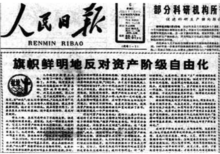
| History of the People's Republic of China |
|---|
 |
|
|
Anti-bourgeois liberalization (simplified Chinese: 反对资产阶级自由化; traditional Chinese: 反對資產階級自由化; pinyin: fǎnduì zīchǎn jiējí zìyóuhuà) as a political slogan of the Chinese Communist Party (CCP), it was proposed by Deng Xiaoping and others in the early 1980s. As a political movement against "bourgeois liberalization", it started at the CCP Congress held in Beijing in September 1986. The Sixth Plenary Session of the Twelfth Central Committee of the CCP was officially launched in early 1987.[1][2][3]
At the end of 1986, the outbreak of the 1986 Chinese student demonstrations forced the reformist General Secretary of the CCP, Hu Yaobang, to resign in early 1987. With the support of Deng Xiaoping, conservative figures Deng Liqun and Hu Qiaomu of the CCP took advantage of the trend. They launched an anti-asset campaign in early 1987—the class liberalization movement.[2][4][5][6] However, the move was later opposed by Zhao Ziyang, acting general secretary of the CCP Central Committee and then Premier of the State Council of China. Zhao Ziyang believed that Deng Liqun and others used the anti-liberalization movement to oppose and deny reform and opening up and used this to convince Deng Xiaoping that the campaign gradually ended in mid-1987.[3][6][5][4]
- ^ Frank (2013-07-18). "邓小平:旗帜鲜明地反对资产阶级自由化_爱思想" [Deng Xiaoping: Take a clear-cut stand against bourgeois liberalization]. www.aisixiang.com. Aisixiang. Retrieved 2023-09-25.
- ^ a b Wu, Wei (2014-03-31). "围绕"反自由化"进行的博弈" [The game surrounding "anti-liberalization"]. 纽约时报中文网 (in Chinese). Retrieved 2023-09-25.
- ^ a b Ruan, Ming (2015-11-23). "一槌定音 邓小平与胡耀邦最后决裂的标志(图)" [The final word marks the final break between Deng Xiaoping and Hu Yaobang]. biweeklyarchive.hrichina.org (in Simplified Chinese). Retrieved 2023-09-25.
- ^ a b Wu, Wei (2014-04-08). "赵紫阳改变"大气候"的 "5.13讲话"" [Zhao Ziyang's "5.13 Speech" to change the "big climate"]. 纽约时报中文网 (in Chinese). Retrieved 2023-09-25.
- ^ a b "专栏 | 夜话中南海: 当局下令不准用邓小平政改讲话影射习近平" [The authorities ordered not to use Deng Xiaoping's political reform speech to allude to Xi Jinping]. Radio Free Asia (in Chinese (China)). radio free asia. 2019-05-03. Retrieved 2023-09-25.
- ^ a b Zhao, Shengyue (2019-05-19). "特别节目 - 六四三十周年回顾中国政治体制改革历程(二 )----与邓小平对表" [Review of China's political system reform process on the 30th anniversary of June 4th]. RFI - 法国国际广播电台 (in Simplified Chinese). Retrieved 2023-09-25.
